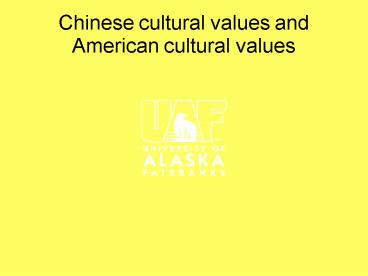Chinese cultural values and American cultural values - PowerPoint PPT Presentation
1 / 26
Title:
Chinese cultural values and American cultural values
Description:
19th century American missionary view of characteristics of Chinese Culture ... Explanation by means of perceived symbols. reliance on sense perception ... – PowerPoint PPT presentation
Number of Views:2334
Avg rating:3.0/5.0
Title: Chinese cultural values and American cultural values
1
Chinese cultural values and American cultural
values
2
To see ourselves as others see us
- 19th century American missionary view of
characteristics of Chinese Culture - 20th century Japanese scholar's view
- 20th century overseas Chinese view of Chinese
values
3
Chinese CharacteristicsArthur H. Smith D.D. 1894
- Face
- Thrift
- Industry
- Politeness
- Disregard of time
- Disregard of accuracy
- Talent for misunderstanding
- Talent for indirection
- Flexible inflexibility
4
Chinese CharacteristicsArthur H. Smith D.D. 1894
- 2
- Intellectual turbidity
- Absence of nerves
- Contempt for foreigners
- Absence of public spirit
- Conservatism
- Indifference to comfort and convenience
- Physical vitality
- Patience and perserverance
5
Chinese CharacteristicsArthur H. Smith D.D. 1894
- 3
- contentness and cheerfulness
- Filial piety
- Benevolence
- Absence of sympathy
- Social Typhoons
- Mutual responsibility and respect for law
- Mutual suspician
- Absence of sincerity
- Polytheism, pantheism and atheism
6
Hajime NakamuraWays of thinking of eastern
peoples
7
CHINA
- Emphasis on perception of the concrete
- e.g. ???, ???
- Explanation by means of perceived symbols
- reliance on sense perception
- e.g. mirrors in huayan ??? explaination of
interpenetration - Non-development of abstract thought
- Lack of consciousness of universals
8
Lack of public debate
- differing role of judge
- Minimal acceptance of formal logic
- Indian epistomological works not translated
9
Not interested in theory for theory's sake
- But what is immediately relevant to practical
understanding - c.f Chan ? antilogic, images
- Emphasis on the particular
- ?? mostly descriptions of incidents and
statements of facts - ? found not through words but through concrete
experience
10
Explanations on the basis of particular incidents
- ????
- Bibliographies and catalogs
- Local gazettes
11
Conservatism expressed through exaltation of
antiquity
- Study of precedents
- use of literary allusions/quotations
- ??
- Continuation of classical way of thinking
- Master's teaching superior to disciples
- Chinese Buddhist biographical records
- Forged sutras
12
Conservatism 2
- Traditional nature of scholarship
- ? means to imitate
- Zhuxi presentation of Neo Confucianism as
annotation of classics
13
Fondness for complex multiplicity expressed in
concrete form
- e.g. painting
14
External (formal) conformity
- Classification of the Dharma systems in Chinese
Buddhism (e.g. 5 periods)
15
Practicality
- Anthropocentric
- practical and utilitarian ways of thinking
- e.g. ????? emphasis on how to rule a state vs
Greek understanding the Universe - Worldly tendency of traditional religion
- Popular Buddhism of spells and prayers
- Hence rejection of ?? in favor of ??
- Transliteration of mantras (e.g. last lines of
??) - ??
- Non-development of metaphysics
16
Individualism
- Need for personal realization of the way
- Non-formation of religious sects
17
Esteem for hierarchy
- Indian sutras mis-translated to include
superior/inferior status (especially for women) - High value on kinship
- Importance of lineage
18
Esteem for nature
- ???
- ?? and ??
19
Reconciling and harmonizing tendencies
- no idea of absolute evil
- no religious wars per se
- syncretism within Buddhism
- syncretism between faiths
20
Chinese Value Survey
- The Chinese Value Survey was developed in the
1980's by Bond and a group of research workers
known collectively as the Chinese Culture
Connection in response to their perceived need to
measure and evaluate cultural values within the
setting of a Chinese social value system that is
derived from the Confucian ethos.
21
Background for Chinese Values Survey
- Asian values debate
- Hong Kong Chinese values survey
- Values selected by overseas Chinese scholars
- Tested on sample of overseas Chinese students
22
CVS-I- INTEGRITY TOLERANCEDEVELOPMENT OF SELF
- 1. Filial piety
- 2. Industry working hard
- 3. Toleranceof others
- 4. Harmonywith others
- 5. Humbleness
- 9. Kindness (forgiveness, compassion
- 10. Knowledge (education)
- 13. Self-cultivation
- 15. Sense of righteousness
23
CVS-I- INTEGRITY TOLERANCEDEVELOPMENT OF SELF
- 2
- 18. Personal steadiness stability
- 21. Sincerity
- 24. Persistence (perseverance)
- 25. Patience
- 28. Adaptability
- 29. Prudence (carefulness)
- 30. Trustworthiness
- 32. Courtesy
24
CVS-IICONFUCIAN ETHOSRELATIONSHIPS WITH OTHERS
- 6. Loyalty to superiors
- 16. Benevolent authority
- 17. Non-competitiveness
- 22. Keeping oneself disinterested and pure
- 33. Contentedness with ones position in life
- 34. Being conservative
- 35. Protecting your face
- 37. Chastity in women
- 38. Having few desires
- 39. Respect for tradition
25
CVS-III-LOYALTY TO IDEALS HUMANITYSOCIAL
RESPONSIBILITY
- 7. Observation of rites social rituals
- 8. Reciprocation of greetings, favors
- 11. Solidarity with others
- 12. Moderation-following the middle way
- 14. Ordering relationships by status
- 19. Resistance to corruption
- 20. Patriotism
- 23. Thrift
- 31. Having a sense of shame
26
CVS-IV-MODERATION MORAL DISCIPLINEWORLDLY
WISDOM
- 26. Repayment of good or evil of others
- 27. Sense of cultural superiority
- 40. Wealth































